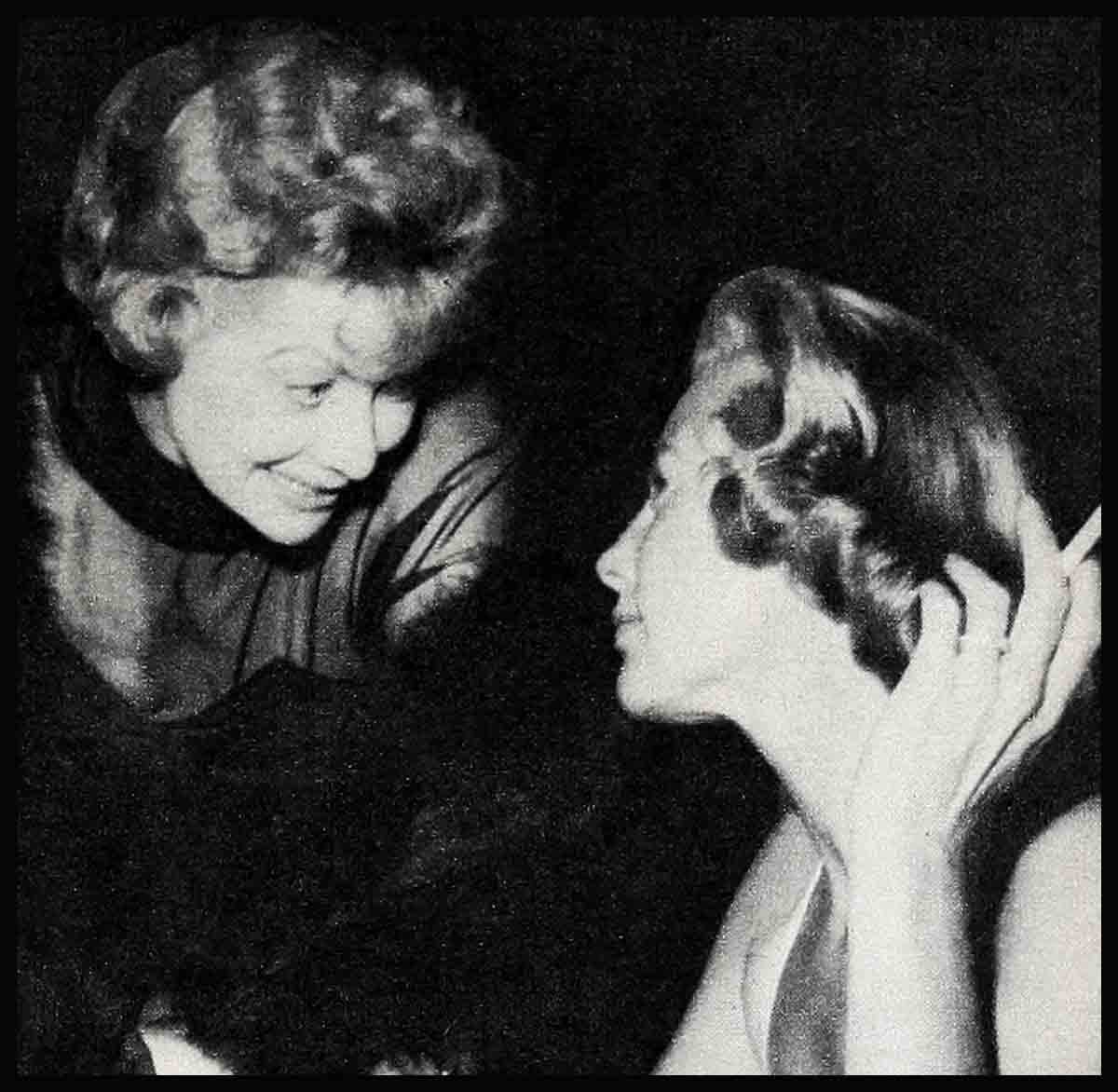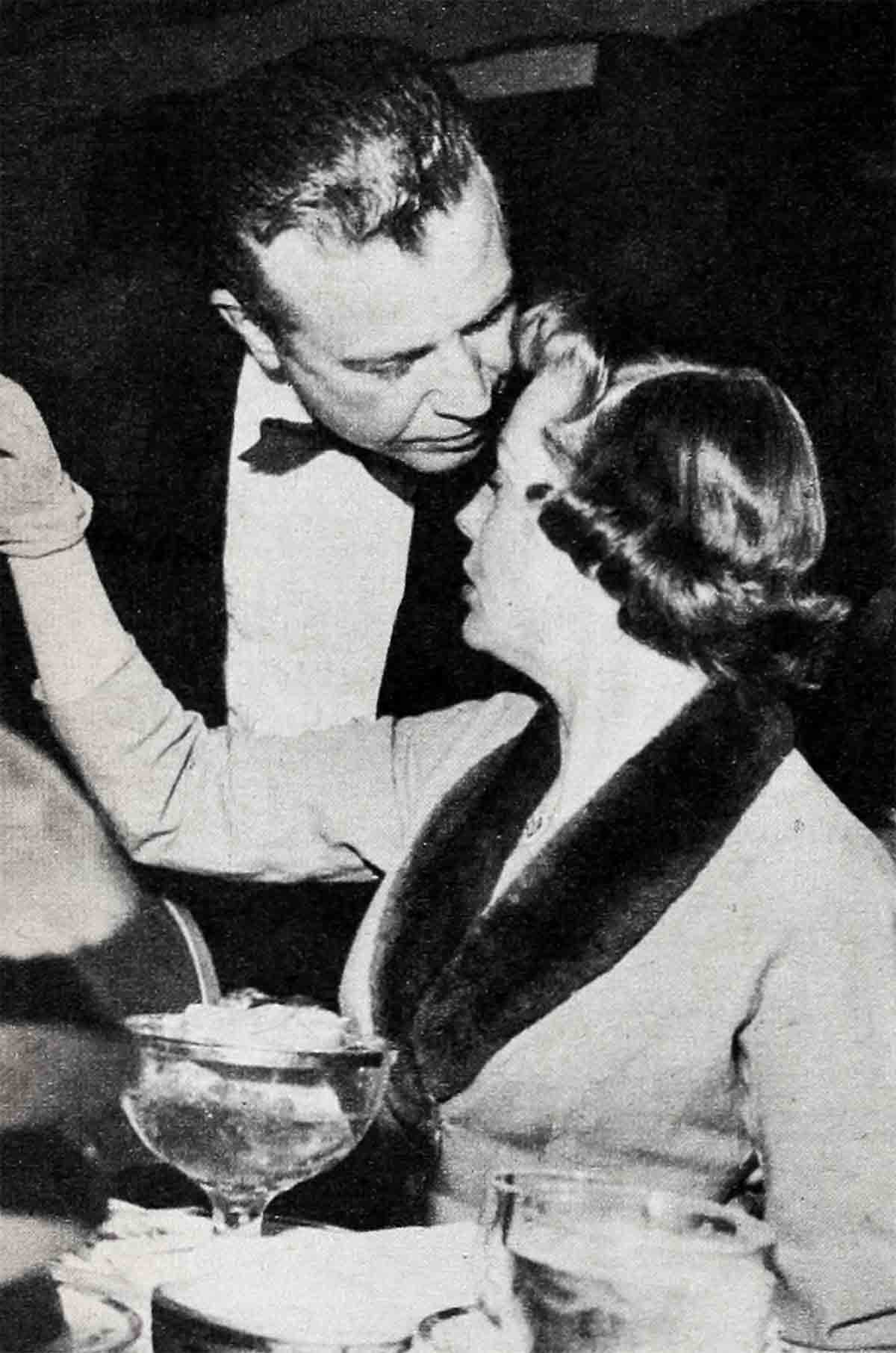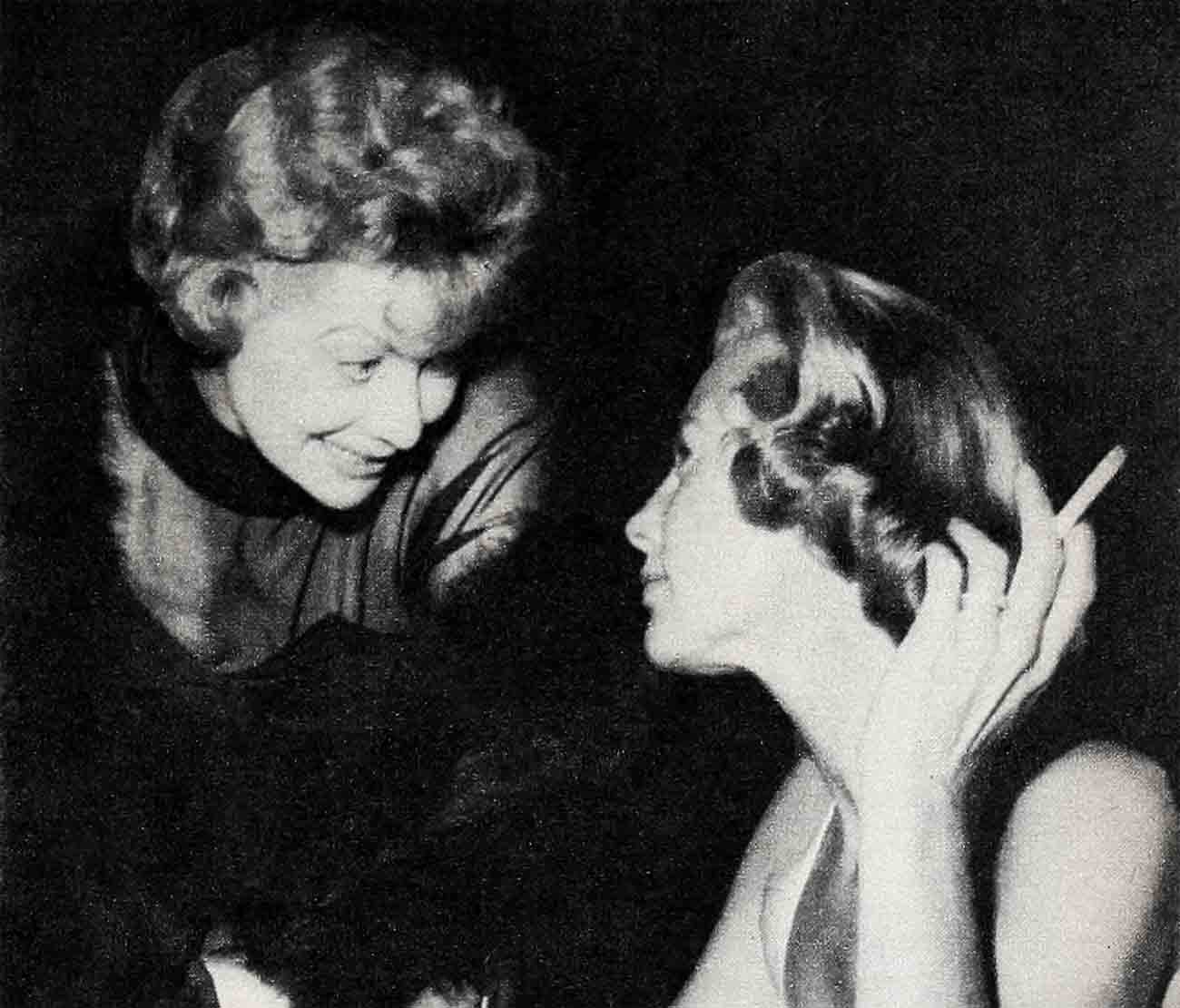
If Lucy Ball Saw June Allyson Now, Would She Tell Her To Do The Same Thing?
The two women stood apart from the intermission crowd at the New York theater. Lucy was doing most of the talking. June, her hands nervously rolling and unrolling the program, listened carefully. From time to time, she’d nod, as if in agreement. She interrupted only twice, to ask a question. From the looks on both women’s faces, it’s certain they weren’t talking about the play. Later, at a restaurant, June still seemed edgy. Lucy whispered something to her and smiled, as if to reassure her. After a while, June seemed to relax a little.
Those who saw the two women together were puzzled. June Allyson and Lucille Ball aren’t friends and never have been. They’ve known about each other for years and years, but in all that time, they never ran in the same crowd, hardly ever saw each other except at big parties. When, suddenly, June picked herself up and flew to New York, the last person anyone expected her to look up was Lucy. And yet now it seemed that this was the very reason June had come three thousand miles—to see Lucy. . . . Why? What was going on? . . . In a matter of weeks, the answer was obvious. Right after her meeting with Lucy, June suddenly stopped squashing the rumors that all was not well with her marriage to Dick Powell. Only a very few people had heard the rumors till then, but now they increased in number and in volume.
And early in January, when a sick and openly weeping June told reporters outright that she and Dick had separated and would seek a divorce, the mystery seemed to be solved. . . . June Allyson was faced with the breakup of her marriage. There was only one other woman in the world who had ever been faced with just her unique and extraordinarily difficult position-and that was Lucille Ball. Even if they’d never been friends, Lucy seemed to be the only person June could turn to for the understanding and advice she needed.
Neither woman is willing to comment on what they talked about. But there were no denials either. After the meeting, people were quick to point out that Lucy, having been through the division of Desilu Studios, might well give June some financial advice. After all, she and Dick also shared an entertainment empire, Four Star Productions. It was true, they had this in common. But June and Lucy also had much more to talk about than finances.
It’s strange that nobody had thought about it before. At first look. June and Lucy seemed two such different types. June was shy. cuddly, with an appealing little-girl quality. Lucy was open and hearty, the typical redhead. And yet their lives have been oddly alike. There is a strange pattern . . .

Tragedy struck
June Allyson and Lucille Ball were born, a few years apart, in New York State. As children they dreamed of show business careers: each was laughed at by friends and relatives who pointed out that they were hardly beauties.
Each girl underwent a tragic experience that almost crippled her for life.
For June it was an accident. She was on the wrong street at the wrong time; a tree, struck by lightning shortly before, began to shake—and dropped a huge branch on her.
Her spine had been injured. Her legs hung useless, immobile. She could scarcely move her arms. And her face, bloodied and torn, was destined to a network of angry red scars.
For Lucille, it was an illness; she contracted pneumonia. Whether through improper treatment, or simply because of the violence of the attack, it left her paralyzed.
For eight months she lay in bed. struggling to move a toe. an ankle, a knee. She had planned to begin her show business career as a chorus girl. Now she was told she might never walk again.
Yet neither girl would consider giving up. Shy. delicate-boned, tiny June Allyson—raucous, wide-mouthed, tall Lucille Ball—separated by miles and by years, they shared an incredible determination. By effort. by stubborn resistance to pain, by sheer will power, they set about restoring themselves to health.
For June there were long hours in a swimming pool, to help move her stiff and aching legs. And then there were the movies to help forget. She loved Fred Astaire’s. She sat through “The Gay Divorcee,” for example, eighteen times. When she came home, she knew every step of the dance routines. Stubbornly, before a mirror, she made her agonized legs repeat the steps over and over. Stubbornly, she kept her eyes away from the dark scars that seamed her face. In a few years, when she was ready to look for work, they would be gone. She would will them away.
She did.
For Lucille, there were exercises that were much the same—and scars that were very different. For three long years she struggled to regain control of her legs. She spent hours listening to the radio, studying the great comedians, their tricks, their timing. The one thing she wanted was to make people laugh. At one point, someone brought a drama coach to see her, to encourage her gallant fight. At the end of the session the man rose, bit his lip, and told her honestly that she did not have a chance. Sick or well, she simply had no talent. There was no laughter in his eyes, only pity.
As stubbornly as June Allyson kept her eyes from her face in the mirror, so Lucille Ball kept her thoughts from that man. his kindness and his judgment. Despite him, despite her unwilling legs, she would be a comedienne.
She was.

They went west
Each girl went west to Hollywood. Here, on a movie sound stage, each met the man she was to marry.
On the surface, no two marriages could have been less alike. Lucille’s took place in 1940. June’s in 1945. Lucille chose a temperamental, unknown Cuban bandleader, some five years younger than herself. June married a somewhat staid, long-established American movie star—more than ten years her senior.
But the truth of the matter is that the marriages were alike—incredibly alike.
Each girl had unerringly chosen a man who would, as the years went on, dominate her completely.
Their reasons were different—Lucy, big-boned, tall, strong-willed, longed for a man who would restore her to gentle, submissive femininity; June, tiny, delicate, shy, was accustomed to being guided and tutored by others. But the results were very much the same. Lucy learned to adapt herself to the Cuban concept of marriage in which the husband made the decisions with or without his wife’s consent, where all joy depended on his good humor, and all contentment for his wife on his protection. It was a way of living totally foreign to Lucy, but it was exactly what she wanted. June began an education even more drastic in her effort to live Richard Powell’s life—she knew literally nothing of the technique of running a large Bel Air home or a Mandeville Canyon estate, of dealing with servants, of hostessing a dinner or cocktail party, or, for that matter, of even talking sensibly to Dick’s intellectual. cultured friends. What it meant was the “making over” of June Allyson. It was exactly what she wanted.
And yet, underneath, both girls suffered deep, almost hidden doubts. Lucille’s were revealed shortly after her wedding, when friends told her frankly that they gave her marriage six months. “Do you?” Lucy said happily. “Eve only been giving it six weeks!”
June’s doubts came out a little differently. In the romantic moment when Dick Powell proposed, he murmured that he wanted to marry her, that he loved her deeply. “And I,” cried June, throwing eager arms about him. “love you, too—Tommy!” She had spoken the name of a childhood sweetheart by mistake.
And so the marriages began. And moved steadily along almost identical paths, under almost identical stress.
At the beginning, there was the strain of being apart. For June and Dick, enforced separations were not really long or frequent. They were apart only when location shooting was required for either of them, and this seldom meant more than a few weeks. But for Lucy and Desi Arnaz, enforced separations were far more severe. Desi toured with his hand for months and months at a time. He and Lucy once estimated that in the early years of their marriage they spent far less than half their time together. In each marriage, the result was one of increased tension. For as the wives’ careers soared, those of the husbands slipped badly.
It was not either man’s fault. The American taste for Latin music had simply faded away. Cuban orchestras, however spirited, were no longer in demand. And Dick Powell had already been in pictures for a long time. With both husbands increasingly worried and discontented, both marriages were soon up against real trouble.
Well-meaning friends thought children might help. Both women had wanted children from the beginning. Lucy had long since agreed to bring hers up as Catholics to please Desi; June was well aware of Dick’s great love for his daughter by a previous marriage to Joan Blondell, and longed to give him a child herself.
But neither woman could have a baby.
Lucy tried, suffered a miscarriage, tried again, lost another baby. June failed to become pregnant, consulted a doctor, and was told that she should not expect to ever conceive a child. She was crushed.
For the first time, each woman seemed to give up hope.
Their marriages faltered
Confused and confusing, the marriages staggered on—and faltered. Lucy’s and Desi’s broke down utterly in 1944, when she divorced her husband. For June and Dick the first official split came in 1957, when Dick moved out of their Mandeville Canyon home. In both cases the decision was made by the woman. And in both cases the women changed their minds and decided to reconcile. Each couple decided to start life over with a complete overhaul of not only their domestic situation, but their careers as well. And each arrived at the same solution.
Both Desi and Dick decided to give up performing for the more demanding, less publicized work of directing and producing. Each was spurred on by natural ability and drive, and by a strong additional impetus—the desire to check forever the tendency of some people to refer to Desi as “Mr. Ball,” to Dick as “Mr. Allyson.” Each, somewhat to the surprise of skeptics, proved a remarkable success.
It seemed to everyone concerned that life had taken a distinct turn for the better.
Other things had improved as well. At thirty-nine Lucy became pregnant again—and succeeded in bringing her first child, Lucy Desiree, into the world. Two years later she had a son. Desi TV. June, some time before, had adopted a baby girl. Pam. Two years after, to her joyous astonishment, she became pregnant. Ricky, her son. was born on Christmas Eve.
Money rolled in. Both men had shrewd business sense. Before long they were working not for others but for themselves. Four Star Productions and Desilu became names to be reckoned with in the world of TV.
But just as strains had emerged from the success of the two women, new tensions appeared born of their husbands’ triumphs.
Both men were soon working eighteen to twenty hours a day. Desi rarely left the RKO studios he had purchased for Desilu. At home, keyed up beyond exhaustion by his fantastic accomplishments, he would pace the house restlessly until Lucy agreed to go out night-clubbing with him—or to let him go alone. Dick, less bound to a single location, flew back and forth to New York, to Europe, from chore to chore, gave interviews, bought scripts, cast, directed and acted in them. Older than Desi. he showed the wear and tear more conventionally—at home he simply collapsed.
Lucy was no businesswoman, no nightclubber. She was willing to put in her time making “I Love Lucy,” but her spare hours she wanted to give to her home, her children, her husband. She was willing to be, on paper, a vice president of Desilu, but violently opposed to letting it dominate her life. June, working less now than Dick, was restless. Still young, poised, beautiful in a more mature way, she wanted a little oJ the glamor and excitement she had been too awkward and frightened to enjoy years before. She was willing to star in some of Dick’s productions, willing to be financially a part of his TV setup, but violently opposed to letting his work rob her of all gaiety, all fun.
Again, each couple struggled valiantly to hold together the shattering bits of their lives. For Lucy and Desi there were compromises—dinner out one night, dinner in the next. For June and Dick there were new notions—a house closer to fashionable Hollywood than their Mandeville Canyon estate, trips to New York and stunning new wardrobes for June.
These were desperate. temporary measures, and, of course, they failed. In spring of 1960, Lucille Ball divorced Desi Arnaz for the second time. In late winter of 1961, June Allyson, after her long talk with Lucille, announced that she had split with Dick Powell for the second time, and her lawyer confirmed that either a legal separation or a divorce would shortly take place.
What took place?
What took place exactly during that long talk in New York?
Whatever she said, it was obviously enough to give June the courage she needed.
But a few weeks after June’s announcement of the split, some people were wondering what Lucille Ball would say then.
For the newspapers were bursting with reports of an impending reconciliation between Lucy and Desi.
But if people had recognized the pattern that Lucille Ball and June Allyson have been sharing for so many years, they would have stopped speculating—and simply waited.
And not for long.
Lucille Ball and Desi Arnaz held a warm reunion in New York—Desi had flown across the country to celebrate his son’s birthday with his ex-wife and family—and to talk about getting hack together again.
On that very day, three thousand miles away. Dick Powell stepped off an airplane in Los Angeles and walked into the outstretched arms of his wife, June, and their daughter and son. At the very moment when the millions who loved Lucy were waiting for the announcement that Desi once more loved her, too, other millions were eagerly reading Dick Powell’s smiling statement: “I still love June and I believe she still loves me. If people will only leave us alone, maybe we can work out our situation.”
Coincidence? Maybe! But so many coincidences have taken place so regularly over so many years.
A few days later, it seemed that neither of the warm reunions had come to anything. Desi went back to Hollywood—alone; Lucy remained in New York with the children. And though June Allyson had welcomed Dick home with a kiss, she turned up promptly for her appointment with the judge, and. tearfully, she picked up the divorce papers.
Still, it’ll be a year before that divorce becomes final. And in a year anything can happen to June and Dick. And to Lucy and Desi, too.
THE END
—BY CHARLOTTE DINTER
See June on “The DuPont Show with June Allyson.” Mon., 10:30 P.M. EST. Dick is on “The Zane Grey Theater,” Thurs., 8:30 P.M. EST. Lucy’s in U-A’s “Facts of Life.”
It is a quote. PHOTOPLAY MAGAZINE APRIL 1961





zoritoler imol
30 Temmuz 2023Hello! This is my first comment here so I just wanted to give a quick shout out and tell you I really enjoy reading through your articles. Can you suggest any other blogs/websites/forums that deal with the same subjects? Thanks!